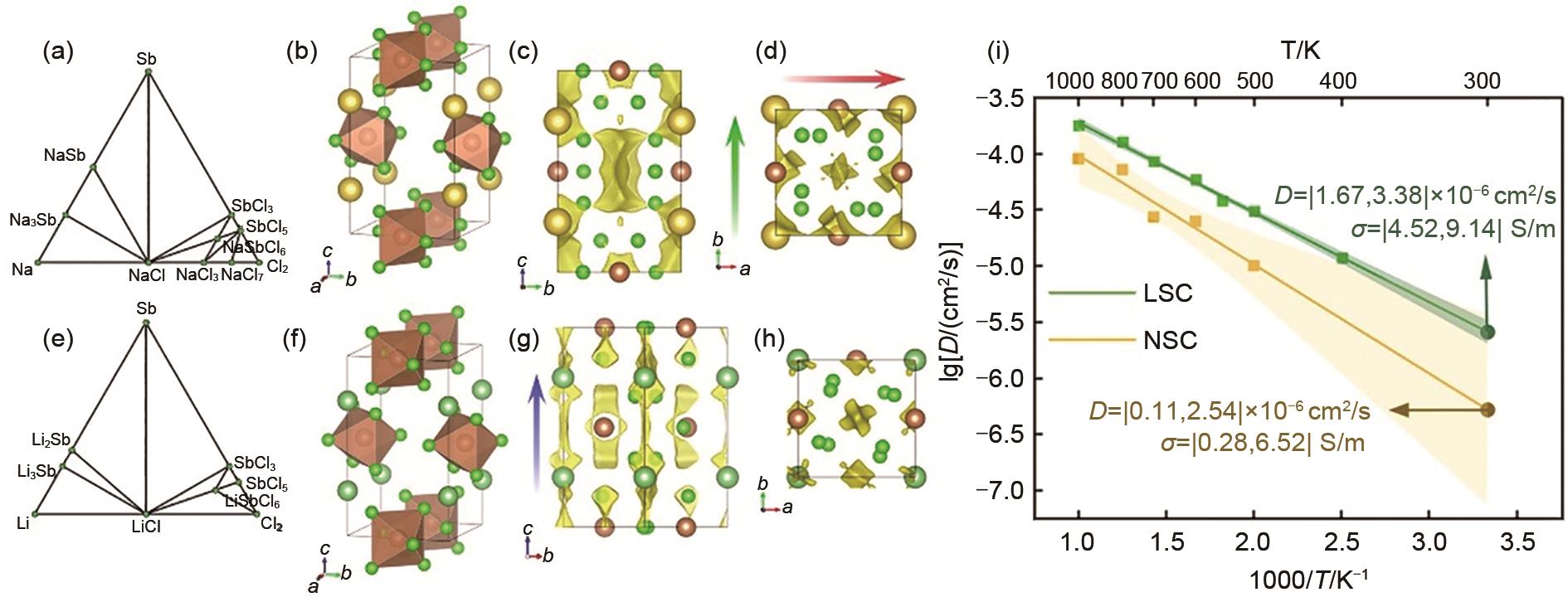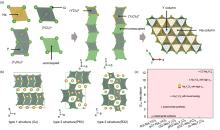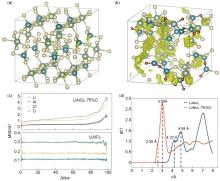Energy Storage Science and Technology ›› 2024, Vol. 13 ›› Issue (9): 2920-2932.doi: 10.19799/j.cnki.2095-4239.2024.0565
Previous Articles Next Articles
Jing XU( ), Yuqi WANG, Xiao FU, Qifan YANG, Jingchen LIAN, Liqi WANG, Ruijuan XIAO(
), Yuqi WANG, Xiao FU, Qifan YANG, Jingchen LIAN, Liqi WANG, Ruijuan XIAO( )
)
Received:2024-06-21
Revised:2024-08-22
Online:2024-09-28
Published:2024-09-20
Contact:
Ruijuan XIAO
E-mail:xujing202@mails.ucas.ac.cn;rjxiao@iphy.ac.cn
CLC Number:
Jing XU, Yuqi WANG, Xiao FU, Qifan YANG, Jingchen LIAN, Liqi WANG, Ruijuan XIAO. Discovery of new battery materials based on a big data approach[J]. Energy Storage Science and Technology, 2024, 13(9): 2920-2932.

Fig. 6
The thermodynamic phase diagrams of NSC (a) and LSC (e). The diagrams of crystalline structures of NSC (b) and LSC (f). The potential energy surface of migration ions of NSC (c), (d) and LSC (g), (h) using BV method; (i) The Arrhenius curves of LSC and NSC by AIMD simulations, respectively[41]"


Fig. 7
(a) The workflow of constructing crystal structures through polyanionic groups. The entire crystal structures of Na3Y2Cl9 are obtained by combining (Y2Cl9)3- and Na+; (b) Three different crystalline of Na3Y2Cl9 designed by polyanionic groups, which space groups are Cc, P63 and R32, respectively; (c) The results of thermodynamic stability of Na3Y2Cl9 constructed by polyanionic groups. The Na3Y2Cl9 with R32 symmetry exhibit the lowest magnitude of energy above hull in virtual structures[44]"


Fig. 9
(a), (b) The atom position distribution in (a) crystal LiAlCl4 and (b) amorphous LiAlCl2.5O0.75. Green, blue, yellow and red spheres represent Li, Al, Cl and O, respectively. The bright-yellow points signify the movement trajectories of Li+ in LiAlCl4 and LiAlCl2.5O0.75 during 100 ps; (c) The MSD of Li, Al, Cl and O in LiAlCl4 and LiAlCl2.5O0.75 during 100 ps obtained by AIMD; (d) The RDF curve of LiAlCl4 and LiAlCl2.5O0.75[48]"

| 1 | WU D X, CHEN L Q, LI H, et al. Recent progress of solid-state lithium batteries in China[J]. Applied Physics Letters, 2022, 121(12): 120502. DOI: 10.1063/5.0117248. |
| 2 | HUANG Y L, CAO B W, GENG Z, et al. Advanced electrolytes for rechargeable lithium metal batteries with high safety and cycling stability[J]. Accounts of Materials Research, 2024, 5(2): 184-193. DOI: 10.1021/accountsmr.3c00232. |
| 3 | WU D X, CHEN L Q, LI H, et al. Solid-state lithium batteries-from fundamental research to industrial progress[J]. Progress in Materials Science, 2023, 139: 101182. DOI: 10.1016/j.pmatsci. 2023.101182. |
| 4 | WU E A, BANERJEE S, TANG H M, et al. A stable cathode-solid electrolyte composite for high-voltage, long-cycle-life solid-state sodium-ion batteries[J]. Nature Communications, 2021, 12(1): 1256. DOI: 10.1038/s41467-021-21488-7. |
| 5 | MIAO X, GUAN S D, MA C, et al. Role of interfaces in solid-state batteries[J]. Advanced Materials, 2023, 35(50): 2206402. DOI: 10.1002/adma.202206402. |
| 6 | LUO Z, QIU X J, LIU C, et al. Interfacial challenges towards stable Li metal anode[J]. Nano Energy, 2021, 79: 105507. DOI: 10.1016/j.nanoen.2020.105507. |
| 7 | SHEN X H, TIAN Z Y, FAN R J, et al. Research progress on silicon/carbon composite anode materials for lithium-ion battery[J]. Journal of Energy Chemistry, 2018, 27(4): 1067-1090. DOI: 10.1016/j.jechem.2017.12.012. |
| 8 | NAM H G, PARK J Y, YUK J M, et al. Phase transformation mechanism and stress evolution in Sn anode[J]. Energy Storage Materials, 2022, 45: 101-109. DOI: 10.1016/j.ensm.2021.11.034. |
| 9 | GOODENOUGH J B, KIM Y. Challenges for rechargeable Li batteries[J]. Chemistry of Materials, 2010, 22(3): 587-603. DOI: 10.1021/cm901452z. |
| 10 | CHEN L H, VENKATRAM S, KIM C, et al. Electrochemical stability window of polymeric electrolytes[J]. Chemistry of Materials, 2019, 31(12): 4598-4604. DOI: 10.1021/acs.chemmater.9b01553. |
| 11 | ZHU Y Z, HE X F, MO Y F. First principles study on electrochemical and chemical stability of solid electrolyte-electrode interfaces in all-solid-state Li-ion batteries[J]. Journal of Materials Chemistry A, 2016, 4(9): 3253-3266. DOI: 10.1039/C5TA08574H. |
| 12 | GU L, ZHU C B, LI H, et al. Direct observation of lithium staging in partially delithiated LiFePO4 at atomic resolution[J]. Journal of the American Chemical Society, 2011, 133(13): 4661-4663. DOI: 10.1021/ja109412x. |
| 13 | ONUMA H, KUBOTA K, MURATSUBAKI S, et al. Phase evolution of electrochemically potassium intercalated graphite[J]. Journal of Materials Chemistry A, 2021, 9(18): 11187-11200. DOI: 10.1039/D0TA12607A. |
| 14 | HE Z Y, ZHANG C X, ZHU Y K, et al. The acupuncture effect of carbon nanotubes induced by the volume expansion of silicon-based anodes[J]. Energy & Environmental Science, 2024, 17(10): 3358-3364. DOI: 10.1039/D4EE00710G. |
| 15 | NOMURA Y, YAMAMOTO K, YAMAGISHI Y, et al. Lithium transport pathways guided by grain architectures in Ni-rich layered cathodes[J]. ACS Nano, 2021, 15(12): 19806-19814. DOI: 10.1021/acsnano.1c07252. |
| 16 | WANG Y, RICHARDS W D, ONG S P, et al. Design principles for solid-state lithium superionic conductors[J]. Nature Materials, 2015, 14(10): 1026-1031. DOI: 10.1038/nmat4369. |
| 17 | 刘振东, 潘嘉杰, 刘全兵. 机器学习在设计高性能锂电池正极材料与电解质中的应用[J]. 化学进展, 2023, 35(4): 577-592. |
| LIU Z D, PAN J J, LIU Q B. Application of machine learning in the design of cathode materials and electrolytes for high-performance lithium batteries[J]. Progress in Chemistry, 2023, 35(4): 577-592. | |
| 18 | XIAO R J, LI H, CHEN L Q. High-throughput design and optimization of fast lithium ion conductors by the combination of bond-valence method and density functional theory[J]. Scientific Reports, 2015, 5: 14227. DOI: 10.1038/srep14227. |
| 19 | ADAMS S, RAO R P. High power lithium ion battery materials by computational design[J]. Physica Status Solidi (a), 2011, 208(8): 1746-1753. DOI: 10.1002/pssa.201001116. |
| 20 | CHEN H M, ADAMS S. Bond softness sensitive bond-valence parameters for crystal structure plausibility tests[J]. IUCrJ, 2017, 4(5): 614-625. DOI: 10.1107/s2052252517010211. |
| 21 | WANG Y Q, SUN X R, XIAO R J, et al. Computational screening of doping schemes for LiTi2(PO4)3 as cathode coating materials[J]. Chinese Physics B, 2020, 29(3): 038202. DOI: 10.1088/1674-1056/ab7186. |
| 22 | HENKELMAN G, UBERUAGA B P, JÓNSSON H. A climbing image nudged elastic band method for finding saddle points and minimum energy paths[J]. 2000, 113(22): 9901-9904. DOI: 10. 1063/1.1329672. |
| 23 | RONG Z Q, KITCHAEV D, CANEPA P, et al. An efficient algorithm for finding the minimum energy path for cation migration in ionic materials[J]. 2016, 145(7): 074112. DOI: 10. 1063/1.4960790. |
| 24 | HE X F, ZHU Y Z, EPSTEIN A, et al. Statistical variances of diffusional properties from ab initio molecular dynamics simulations[J]. NPJ Computational Materials, 2018, 4: 18. DOI: 10.1038/s41524-018-0074-y. |
| 25 | WANG S, BAI Q, NOLAN A M, et al. Lithium chlorides and bromides as promising solid-state chemistries for fast ion conductors with good electrochemical stability[J]. Angewandte Chemie International Edition, 2019, 58(24): 8039-8043. DOI: 10.1002/anie.201901938. |
| 26 | WANG Y Q, WU S Y, SHAO W, et al. Accelerated strategy for fast ion conductor materials screening and optimal doping scheme exploration[J]. Journal of Materiomics, 2022, 8(5): 1038-1047. DOI: 10.1016/j.jmat.2022.02.010. |
| 27 | BARTÓK A P, KONDOR R, CSÁNYI G. On representing chemical environments[J]. Physical Review B, 2013, 87(18): 184115. DOI: 10.1103/physrevb.87.184115. |
| 28 | BOTU V, RAMPRASAD R. Learning scheme to predict atomic forces and accelerate materials simulations[J]. Physical Review B, 2015, 92(9): 094306. DOI: 10.1103/physrevb.92.094306. |
| 29 | WANG H, ZHANG L F, HAN J Q, et al. DeePMD-kit: A deep learning package for many-body potential energy representation and molecular dynamics[J]. Computer Physics Communications, 2018, 228: 178-184. DOI: 10.1016/j.cpc.2018.03.016. |
| 30 | DENG B W, ZHONG P C, JUN K, et al. CHGNet as a pretrained universal neural network potential for charge-informed atomistic modelling[J]. Nature Machine Intelligence, 2023, 5: 1031-1041. DOI: 10.1038/s42256-023-00716-3. |
| 31 | BATZNER S, MUSAELIAN A, SUN L X, et al. E(3)-equivariant graph neural networks for data-efficient and accurate interatomic potentials[J]. Nature Communications, 2022, 13: 2453. DOI: 10.1038/s41467-022-29939-5. |
| 32 | BEHLER J. Atom-centered symmetry functions for constructing high-dimensional neural network potentials[J]. Journal of Chemical Physics, 2011, 134(7): 074106. DOI: 10.1063/1.3553717. |
| 33 | BEHLER J. Four generations of high-dimensional neural network potentials[J]. Chemical Reviews, 2021, 121(16): 10037-10072. DOI: 10.1021/acs.chemrev.0c00868. |
| 34 | GASTEGGER M, SCHWIEDRZIK L, BITTERMANN M, et al. WACSF-Weighted atom-centered symmetry functions as descriptors in machine learning potentials[J]. Journal of Chemical Physics, 2018, 148(24): 241709. DOI: 10.1063/1.5019667. |
| 35 | XIE T, GROSSMAN J C. Crystal graph convolutional neural networks for an accurate and interpretable prediction of material properties[J]. Physical Review Letters, 2018, 120(14): 145301. DOI: 10.1103/PhysRevLett.120.145301. |
| 36 | LIU Y, YANG Z W, ZOU X X, et al. Data quantity governance for machine learning in materials science[J]. National Science Review, 2023, 10(7): nwad125. DOI: 10.1093/nsr/nwad125. |
| 37 | LIU Y S, HE X F, MO Y F. Discrepancies and error evaluation metrics for machine learning interatomic potentials[J]. NPJ Computational Materials, 2023, 9: 174. DOI: 10.1038/s41524-023-01123-3. |
| 38 | MUSAELIAN A, BATZNER S, JOHANSSON A, et al. Learning local equivariant representations for large-scale atomistic dynamics[J]. Nature Communications, 2023, 14(1): 579. DOI: 10. 1038/s41467-023-36329-y. |
| 39 | XIAO R J, LI H, CHEN L Q. High-throughput computational discovery of K2CdO2 as an ion conductor for solid-state potassium-ion batteries[J]. Journal of Materials Chemistry A, 2020, 8(10): 5157-5162. DOI: 10.1039/C9TA13105A. |
| 40 | HE J G, YAO Z P, HEGDE V I, et al. Computational discovery of stable heteroanionic oxychalcogenides ABXO (A, B = metals; X = S, Se, and Te) and their potential applications[J]. Chemistry of Materials, 2020, 32(19): 8229-8242. DOI: 10.1021/acs.chemmater.0c01902. |
| 41 | FU X, WANG Y Q, XU J, et al. First-principles study on a new chloride solid lithium-ion conductor material with high ionic conductivity[J]. Journal of Materials Chemistry A, 2024, 12(17): 10562-10570. DOI: 10.1039/D3TA07943K. |
| 42 | WANG X L, XIAO R J, LI H, et al. Oxysulfide LiAlSO: A lithium superionic conductor from first principles[J]. Physical Review Letters, 2017, 118(19): 195901. DOI: 10.1103/PhysRevLett.118.195901. |
| 43 | WANG Y C, LV J, ZHU L, et al. CALYPSO: A method for crystal structure prediction[J]. Computer Physics Communications, 2012, 183(10): 2063-2070. DOI: 10.1016/j.cpc.2012.05.008. |
| 44 | XU J, WANG Y Q, WU S Y, et al. New halide-based sodium-ion conductors Na3Y2Cl9 inversely designed by building block construction[J]. ACS Applied Materials & Interfaces, 2023, 15(17): 21086-21096. DOI: 10.1021/acsami.3c01570. |
| 45 | WAROQUIERS D, GONZE X, RIGNANESE G M, et al. Statistical analysis of coordination environments in oxides[J]. Chemistry of Materials, 2017, 29(19): 8346-8360. DOI: 10.1021/acs.chemmater.7b02766. |
| 46 | WU S Y, XIAO R J, LI H, et al. Ionic conductivity of LiSiON and the effect of amorphization/heterovalent doping on Li+ diffusion[J]. Inorganics, 2022, 10(4): 45. DOI: 10.3390/inorganics10040045. |
| 47 | LIN L Y, GUO W, LI M J, et al. Progress and perspective of glass-ceramic solid-state electrolytes for lithium batteries[J]. Materials, 2023, 16(7): 2655. DOI: 10.3390/ma16072655. |
| 48 | DAI T, WU S Y, LU Y X, et al. Inorganic glass electrolytes with polymer-like viscoelasticity[J]. Nature Energy, 2023, 8: 1221-1228. DOI: 10.1038/s41560-023-01356-y. |
| 49 | XU J, XIAO R, LI H. ESM cloud toolkit: A copilot for energy storage material research[J]. Chinese Physics Letters, 2024, 41(5): 054701. DOI: 10.1088/0256-307x/41/5/054701. |
| 50 | 王丹, 周明波, 黄东宸, 等. 凝聚态物质科学科研数据管理与应用[J]. 科学通报, 2024, 69(9): 1164-1174. |
| WANG D, ZHOU M B, HUANG D C, et al. Management and application of research data in condensed matter science[J]. Chinese Science Bulletin, 2024, 69(9): 1164-1174. | |
| 51 | LIU Y, LIU D H, GE X Y, et al. A high-quality dataset construction method for text mining in materials science[J]. Acta Physica Sinica, 2023, 72(7): 070701. DOI: 10.7498/aps.72.20222316. |
| 52 | 刘悦, 邹欣欣, 杨正伟, 等. 材料领域知识嵌入的机器学习[J]. 硅酸盐学报, 2022, 50(3): 863-876. DOI: 10.14062/j.issn.0454-5648. 20220093. |
| LIU Y, ZOU X X, YANG Z W, et al. Machine learning embedded with materials domain knowledge[J]. Journal of the Chinese Ceramic Society, 2022, 50(3): 863-876. DOI: 10.14062/j.issn. 0454-5648.20220093. |
| [1] | Yuhang YUAN, Yuchen GAO, Jundong ZHANG, Yanbin GAO, Chaolong WANG, Xiang CHEN, Qiang ZHANG. The application of large language models in energy storage research [J]. Energy Storage Science and Technology, 2024, 13(9): 2907-2919. |
| [2] | Jiahui HUANG, Zhufang KUANG. The forefront of the integration of artificial intelligence and energy storage technologies [J]. Energy Storage Science and Technology, 2024, 13(9): 3161-3181. |
| [3] | Junyu JIAO, Quanquan ZHANG, Ningbo CHEN, Jiyu WANG, Qiudi LU, Haohao DING, Peng PENG, Xiaohe SONG, Fan ZHANG, Jiaxin ZHENG. Development and applications of an intelligent big data analysis platform for batteries [J]. Energy Storage Science and Technology, 2024, 13(9): 3198-3213. |
| [4] | Ziyu LIU, Zekun JIANG, Wei QIU, Quan XU, Yingchun NIU, Chunming XU, Tianhang ZHOU. Application of artificial intelligence in long-duration redox flow batteries storage systems [J]. Energy Storage Science and Technology, 2024, 13(9): 2871-2883. |
| [5] | Bin DENG, Haiming HUA, Yuzhi ZHANG, Xiaoxu WANG, Linfeng ZHANG. Deep potential model: Applications and insights for electrochemical energy storage materials [J]. Energy Storage Science and Technology, 2024, 13(9): 2884-2906. |
| [6] | Yingying XIE, Bin DENG, Yuzhi ZHANG, Xiaoxu WANG, Linfeng ZHANG. Intelligent R&D of battery design automation in the era of artificial intelligence [J]. Energy Storage Science and Technology, 2024, 13(9): 3182-3197. |
| [7] | Hui FANG. Functional safety guarantee strategy for low temperature lithium battery energy storage system under network analysis mode [J]. Energy Storage Science and Technology, 2024, 13(7): 2447-2449. |
| [8] | Lijie YANG. Research on the application of phase change energy storage materials in construction engineering [J]. Energy Storage Science and Technology, 2024, 13(5): 1471-1473. |
| [9] | Linghua SHI, Songli WU. Energy storage safety of big data type heat storage system [J]. Energy Storage Science and Technology, 2024, 13(5): 1603-1605. |
| [10] | Yongna LI. Research on the application of big data technology in large-scale energy storage battery management systems [J]. Energy Storage Science and Technology, 2024, 13(4): 1353-1355. |
| [11] | Hongpei NIU. Research on the application of phase change energy storage materials in energy saving building design [J]. Energy Storage Science and Technology, 2024, 13(3): 847-849. |
| [12] | Wen PEI. Preparation and thermal properties analysis of phase change energy storage materials in marine logistics [J]. Energy Storage Science and Technology, 2024, 13(3): 844-846. |
| [13] | Fang LI, Yongjun MIN, Yong ZHANG. Review of key technology research on the reliability of power lithium batteries based on big data [J]. Energy Storage Science and Technology, 2023, 12(6): 1981-1994. |
| [14] | Rong YIN. The application of computer technology in enhancing the energy efficiency of phase change thermal storage [J]. Energy Storage Science and Technology, 2023, 12(12): 3889-3891. |
| [15] | Jie JU, Ruifang CHEN, Gang WEI. Application of new phase change energy storage materials in building engineering [J]. Energy Storage Science and Technology, 2023, 12(12): 3883-3885. |
| Viewed | ||||||
|
Full text |
|
|||||
|
Abstract |
|
|||||
